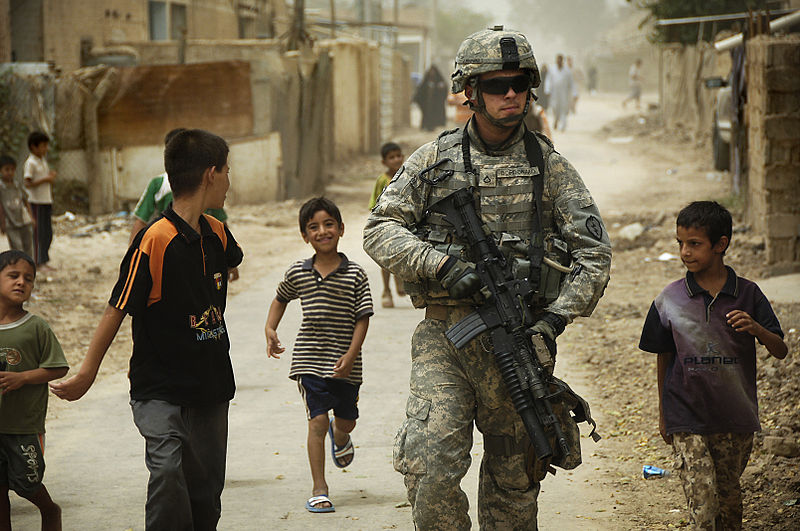Why America Failed in the Middle East (and Why We Will Continue to Do So)
January 9, 2018
In 2003, the world watched as the Bush administration invaded Iraq, citing Saddam Hussein’s purported possession of weapons of mass destruction. Though the U.S. had intervened in the Middle East before, leading an international coalition against Iraq during the Persian Gulf War of the 1990s, that particular intervention remains in our national consciousness for a number of reasons. The first lies in its relative recentness: the formal withdrawal of U.S. troops was only completed in 2011. The second is the continuing controversy over whether such a war was ever needed: even in 2016, presidential hopefuls attacked their opponents over their past support of the war. The last is the most critical for our understanding of American intervention overseas today: the U.S., in many ways, failed to truly reform Iraq, and perhaps failed Iraq altogether.
U.S. intervention in Iraq manifested itself militarily. Perhaps this was a logical response at the time: the Gulf War was undoubtedly a success for the American-led coalition, and intervention in that case had consisted of sending ground troops, aircraft, and ships. That response, however, overlooked the unique nature of the conflict the U.S. had created. The U.S. was no longer intervening in a war between two regional powers; it had started its own war, and among its first moves was the toppling of a nation’s leader with the intention of reforming that nation in its own image. Indeed, the official name for the Iraq War was actually “Operation Iraqi Freedom,” referring to the illiberal regime headed by Hussein. However, there were many additional actions that needed to be taken in order to achieve that lofty goal, such as investing in Iraq’s infrastructure and reaching out to affected citizens, yet those were continuously ignored in favor of troop surges and dramatic images of soldiers riding through the desert on tanks.
Granted, the U.S. did attempt to set up a democratic government in Iraq. The U.S. spent approximately $1.82 billion on measures to encourage a democratic, liberal Iraq. However, that sum is much less impressive when both the total cost of the Iraq War—at least over $800 billion—and the money allocated for the rebuilding of Iraq—around $60 billion—are considered. Additionally, much of that money went to creating only the framework for a democracy, such as a constitution and a parliament, and not to coordinating the logistics of a democratic Iraq, a multi-ethnic and multi-religious state with long-running sectarian tensions. Perhaps unsurprisingly, the current Iraqi administration is notoriously corrupt, and Iraq is classified as “Not Free” by Freedom House, placing it in the same category as Saudi Arabia and Libya. America’s failed attempts at nation-building also led to the growth of fundamentalist and terrorist organizations in Iraq, including ISIL.
As such, it is undeniable that America failed to reform Iraq because it failed to invest in Iraq as a nation. What is truly troubling, however, is that we seem on course to make those same mistakes again.
Today, the U.S. is again enmeshed in an Iraqi conflict, though we are now fighting alongside Iraqi forces and not against them. The tangible fight against ISIL in Iraq has begun to wind down, with the terrorist group having lost all territory in Iraq during December of 2017. Again, the U.S. is poised to forgo the dirty work of nation-building. This time, however, another nation is ready to take on that mantle: Iran. As part of Iran’s attempt to expand its regional hegemony, or dominance, it has flooded Iraqi marketplaces with Iranian goods and created an Iraqi media sympathetic to Iranian causes. If the U.S. truly wishes to see a more stable, independent Middle East in the near future, we must do more to combat Iranian hegemony.
The most direct way of doing so is by allocating more funds for nation-building, from reaching out to displaced civilians to helping weed out corruption in not just Iraq but other Middle Eastern countries as well. An approach dedicated to expanding U.S. soft power in the Middle East through the traditional avenues of film and television might work wonders as well, particularly since Iran has been undertaking such an approach for a number of years.
Of course, these possibilities seem unlikely under the current presidential administration, which, similar to the Bush administration, seems to value military action over long-term work on the ground. Trump has consistently undermined and disparaged nation-building and has failed to fill many key administrative positions, including ambassadorships to Middle Eastern nations. Additionally, the U.S. is willingly retreating from the mantle of global leadership in all non-military fields; though Trump’s “America First” proclamation has failed to amount to much concrete action, it has served to diminish the projection of U.S. authority, which is critical for the expansion of U.S. soft power. In the second year of Trump’s presidency, it does not seem like any changes to his current position will come.
It thus appears that there will be no nation-building occurring in either Iraq or the Middle East in the near future, despite the positive effects of such a policy. George W. Bush once infamously proclaimed, “Fool me once, shame on you. Fool me—you can’t get fooled again.” America was fooled once by the possibility that military action alone would be enough to create a more stable Middle East, and with the way things are going, it seems we will be again.

















































































































































